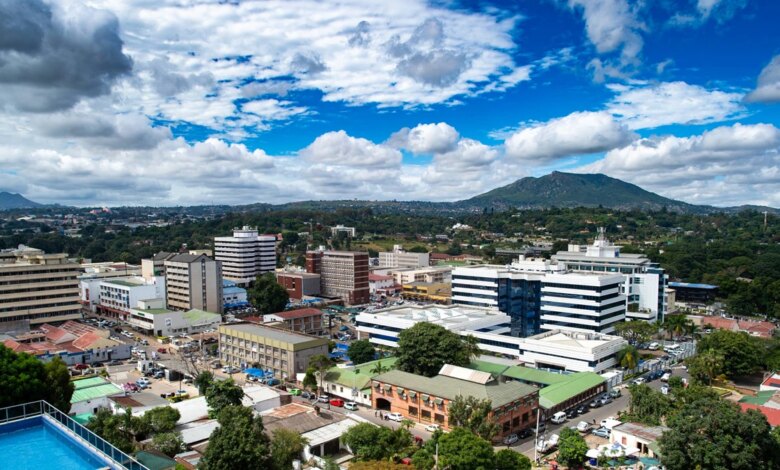Wall Street in Africa silences Christian worship… | news report

Noisy Pentecostal worship is part of the soundtrack of Africa’s major cities. From Johannesburg, South Africa, to Lagos, Nigeria, booming preaching and boisterous worship resonates from alleys, apartments and street corners.
But in Blantyre, Malawi’s commercial capital, the noise of churches is conspicuously absent.
Although located in one of the poorest nations in Africa and the world, Blantyre’s central business district contains one of the largest concentrations of investment banks, hedge funds, insurance companies and fine restaurants on the continent.
Banks such as the National Bank of Malawi fight for space in the district with foreign giants such as Standard Bank Group (Africa’s richest in assets) and the dominant high-rise Reserve Bank of Malawi, the country’s equivalent to the Federal Reserve.
“It is a Wall Street of the southern African region. The city is artificially too clean, too smart and designed for banks,” said Susan Mani, one of the few highly regulated mobile chefs who serve rice and chicken to bankers and hedge fund managers during a two-hour lunch.
“The thinking of the city fathers is: ‘Do you want a loud, prayerful African church playing drums in the basement when hedge fund investors from Singapore or Dubai gather in a bank boardroom above?’ ‘”
City officials have made it clear their answer is no. While quieter Anglican and Adventist congregations dot the streets of Blantyre, the rowdy churches started in Africa are unwanted. They face fines or possible expulsion from the district for their traditional style of worship.
“It is costly to be caught leading a church where the drums, loud prayers and the noise of thunderous sermons filter into the street,” said Dennis Labo, pastor of Zion Christian Church (ZCC Malawi), an African Pentecostal church that has thousands of followers in Malawi and neighboring African countries.
Labo was fined 370,000 kwacha (US$220) and ordered to move his 80-person congregation from the avenue that houses the National Bank of Malawi, the country’s richest bank.
“Blantyre City Council wants to present the city [central business district] as the epitome of a clean business district without…noisy churches or fruit vendors,” he said.
Pentecostal churches are not the only targets. Council member Gerald Lipikwe emphasized that any church, business, party or home that exceeds noise thresholds in the central business district can face heavy fines, license restrictions or expulsion.
Blantyre follows Rwanda’s harsh bureaucracy, which restricts African Pentecostal churches, forcing congregations to hold secret, silent services primarily on Fridays after business hours.
“We dare to hold informal services when the bankers have left town,” Nisbert, an African evangelical pastor, told CT.
He avoids giving his last name because his church risks being expelled from Blantyre’s central business district. She is on her final warning after holding an all-night prayer meeting that disrupted a corporate meeting at the nearby Malawi Stock Exchange.
Restrictions on African worship also hurt church growth, pastors say. In a country that is three-quarters Christian, evangelical and Pentecostal churches are eager to attract young black bankers who can afford to tithe generously.
Blantyre was the colonial capital of Malawi, the headquarters of banks, universities, hospitals and government offices. In 1975, a decade after the end of British rule, the Malawian government gradually transferred its offices to its current capital, Lilongwe, a new town built in the bush.
But the banks never left the old capital, Labo said. Even today, there remains a presidential palace in Blantyre.
The place where British colonial plantation owners racked up extravagant profits from sugar cane and tobacco remains “Malawi’s money city”, according to John Tembo, an independent financial historian who has lived in Blantyre for the past 50 years. years.
The city’s hostility toward rowdy congregations (code for “indigenous African churches”) is unfair, Tembo said. Many members of the political and banking elite attend Anglican and Baptist parishes, which are considered “posh” and “civilized.”
“European and American heritage churches, like Adventists and Anglicans, have big venues and hold services,” Tembo said, pointing to a sprawling Adventist hospital along Blantyre’s city center’s posh hotel street. “The so-called ‘civilized’ European churches in the Blantyre business district have invested in high-class hospitals, so they are tolerated.”
Pentecostal or evangelical churches are often unregistered and informal, so the city does not tax them.
The history of churches in Malawi is colourful, varied and synonymous with the colonial takeover of the territory formerly called Nyasaland. When the Scottish missionary David Livingstone arrived at Lake Malawi (then Nyasa) in 1859, he established the country’s first mission church. Anglican missionaries such as Edward Steere followed, as did Dutch Reformed missionaries and, later, the Catholic Church.
Anglican rule helped solidify the 1891 colonial takeover of the country by the British crown. Africans who converted to the faith largely joined the Anglican church because it built the largest number of schools, hospitals and universities in Malawi.
They were followed closely by the Adventists, the Dutch Reformed and the Catholics. There were not many independent African churches in Malawi when the country emerged from colonial rule in 1964 or in the following two decades. But as the sense of independence and access to education grew in Malawi in the 1980s, so did the spirit and confidence to establish church plants in Africa.
Numerous churches led by Africans (Christian Zionists, Pentecostals and Evangelicals) multiplied in Malawi, many of which mixed traditional African ancestral beliefs and Christian values. Due to class differences, they almost never united or cooperated with believers in the ancient European and American churches.
However, the only meeting point was when parishioners of upstart African churches attended Anglican or Catholic primary schools and urgent care clinics. In impoverished postcolonial Malawi, Western-founded churches still provided education, healthcare, and aid.
In the early 2000s, a new Pentecostal Christian awakening began to spread across Africa. As African economies were hit by austerity imposed by the World Bank, dubious African “prophets” like Shepherd Bushiri in Malawi and TB Joshua in Nigeria began dazzling millions of poor African believers with promises of miracles and instant wealth.
Millions of black Malawians were conquered and began to leave inherited colonial churches and older African churches for the charismatic prophets of “miracles”. For the country’s poor believers, the promise of instant wealth and miraculous breakthroughs has significant appeal.
Mani, the lunch vendor, says the restrictions and stigma around African churches reflect underlying attitudes against the poor in a country with extreme inequality. Oxfam America It says that just 10 percent of the population consumes 22 times more resources than the poorest Malawians.
“It is a dangerous inequality,” said Pastor Labo. “Just a few meters from Blantyre’s central banking district you will find the most chaotic slums where the true citizens, the majority of Blantyre, live and worship loudly.”




